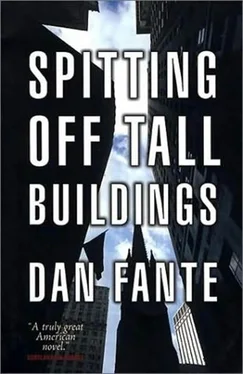Dan Fante - Spitting Off Tall Buildings
Здесь есть возможность читать онлайн «Dan Fante - Spitting Off Tall Buildings» весь текст электронной книги совершенно бесплатно (целиком полную версию без сокращений). В некоторых случаях можно слушать аудио, скачать через торрент в формате fb2 и присутствует краткое содержание. Жанр: Триллер, на английском языке. Описание произведения, (предисловие) а так же отзывы посетителей доступны на портале библиотеки ЛибКат.
- Название:Spitting Off Tall Buildings
- Автор:
- Жанр:
- Год:неизвестен
- ISBN:нет данных
- Рейтинг книги:4 / 5. Голосов: 1
-
Избранное:Добавить в избранное
- Отзывы:
-
Ваша оценка:
- 80
- 1
- 2
- 3
- 4
- 5
Spitting Off Tall Buildings: краткое содержание, описание и аннотация
Предлагаем к чтению аннотацию, описание, краткое содержание или предисловие (зависит от того, что написал сам автор книги «Spitting Off Tall Buildings»). Если вы не нашли необходимую информацию о книге — напишите в комментариях, мы постараемся отыскать её.
Spitting Off Tall Buildings — читать онлайн бесплатно полную книгу (весь текст) целиком
Ниже представлен текст книги, разбитый по страницам. Система сохранения места последней прочитанной страницы, позволяет с удобством читать онлайн бесплатно книгу «Spitting Off Tall Buildings», без необходимости каждый раз заново искать на чём Вы остановились. Поставьте закладку, и сможете в любой момент перейти на страницу, на которой закончили чтение.
Интервал:
Закладка:
In New York Hospital they assigned me to Jack Bratter. A shrink. Jack’s job was to bring me in twice a day for private sessions, ask a lot of questions and determine if I was crazy and a danger to myself. He would evaluate whether or not I should be let go or placed in a rubber condo somewhere. I didn’t care. I didn’t give a rat’s dick what they did with me.
Jack was a good guy. Older, but smart. He had been a desk sergeant in Manhattan South for twelve years before retiring from the police. He’d gone back to school at Hunter College, then taken up shrink as a profession. He liked that I was a writer. He had read some of my father’s books. We talked a lot about plays. His theatrical interest was in classic theatrical comedy; Molière, guys like that.
I told Jack the truth. Mostly. I said things had come to a head after the hold-up. The despair, et cetera.
Jack was more concerned about my drinking than anything else. Also about my anger fits while I was drinking and sober. He was curious to know the kinds of things that set me off; what I thought about this and what I thought about that: ‘What did you think then, Bruno?…After that happened, how did you feel?…You must’ve been upset.’ Blah, blah, blah…Blah, blah, blah.
One week into the deal, after the individual sessions and twice-a-day in group, Jack gave me some news. ‘Good news,’ he said. He had determined that I was not crazy. That the twenty-four-hour-a-day voices in my head and my behavior were, to him, symptoms of alcoholism.
According to Jack, being an alcoholic is a mind disease like manic depression. It describes the way an alkie’s mind has come to work. Sober or drunk. He said that my depressions and rages and disgusting degenerate behavior and the other stuff were by-products of my alcoholism.
Alkies, Jack says, are characterized not only by their drinking, which of course is the main big symptom, but also by their craziness while they are sober. After a certain point in the progression of the disease a person’s perceptions change. There is an automatic mental distortion of information; damaged, fucked mental software. With and without a drink.
Jack says that I had developed this type of ‘personality’ over time. A new character. To keep my mind comfortable and under control, my disease required me to drink more and more because things in the world become more and more unacceptable with my type of alcoholic ‘personality.’
Booze, Jack says, can work real well for years, like a pill, to treat this personality. But eventually it has to turn on you, stop working, and bite you on the ass. According to Jack, that’s what happened to me.
He said this: that there was nothing really he could do to help me stop the depressions or trying to kill myself. In his experience, still-drinking alcoholics like me, as a functioning, walking-around class of people, are the furthest from any kind of emotional or spiritual peace. From God.
At the end of the mandatory ten days, on the morning of my release from the hospital, Jack said that if I continued with booze I would be like someone carrying cans of gasoline to a fire. He said there wasn’t much hope.
I liked Jack. They were letting me out and they could no longer hold me for any reason so I was completely straight with him. I said honestly that I did not agree. To me I was chemically imbalanced. I needed some kind of medication; Prozak or Elavil or lithium. One of those. Other people on my ward who took mood stabilizers had my same symptoms. Jack refused to give me anything to help so I got up and walked out.
Chapter Twenty-two
ME AND MY rooming-house manager, Bert, had always gotten on fairly well. Bert was part Indian. American Indian. Big and mean but he liked me because we both drank whiskey and we were both fans of the New York Mets.
He’d arrived in Manhattan five years before me with his old lady Angel-Lee and their two kids. At the time the couple met and started a relationship he was forty-one, Angel was nineteen. She had been a dancer, the prettiest black girl in Fort Smith.
For his first few years in New York Bert worked in construction assembly, steel framing on skyscrapers. Then, by chance, he discovered his real aptitude; the one for insurance scams and welfare swindling.
One day at the job site he slipped on a cable spool, fell, and got a minor strain in his back. He decided to fake it a little and take a few days off to watch the end of the baseball playoffs on TV. His job foreman sent him to a doctor. There in the waiting room Bert ran into a guy he had once worked with. Another Indian. The guy had a limp and was walking with a cane but he was wearing a colorful Hawaiian sports shirt. In their conversation it came out that the fellow had been collecting $540 tax free every two weeks for the last year for his own back injury. Currently, he was spending his afternoons making bets and limping up and down the steps to the Club House at Aquaduct racetrack.
That was the beginning.
Three years later Bert was deep into a Workman’s Comp lawsuit and opening his mail twice a month to find over a thousand dollars’ worth of checks from the insurance company. His bogus back-injury claim had begun that day at the doctor’s office. These days Bert spent his time drinking whiskey and Rheingold beer, watched the Mets on TV, and, as an under-the-table sideline, managing the rooming house where I lived.
He and Angel had never officially married so she was on welfare as an unemployed single mother. Her own second income came from a steady night gig, waitressing in a titty bar off Times Square. The girls, twins, Carrie and Connie, were now eleven years old. Nice kids. Sweet.
Bert knew about my hold-up in the taxi. It was he and my neighbor Dylan who had unlocked my door to let the police and the paramedics in after I tried to kill myself by taking the Valium and pain pills.
The afternoon I got back from the hospital and knocked on his door to get my mail and pay my back rent, Bert asked me inside. He always had beer, good and cold, so I stepped in.
During one of the commercials Bert smiled over at me and slapped his leg. He asked me if I had ever heard of Victim Stress Disorder. I said that I had not. Then he began to laugh. It continued for several seconds. When he stopped he was standing over my chair and pointing down. He said that to him, the second after I’d opened his front door, he knew. I looked like a man with incurable Victim Stress Disorder. For the rest of the afternoon we talked about VSD and drank and watched the Mets lose.
Bert’s attorney was Robert Edward Francis Duffy. Duffy’s office was on Twenty-third Street in the Flatiron Building. He practiced one kind of law only: work-related personal injury. Workman’s Comp lawsuits.
Bert bragged that Duffy had an address book overflowing with the names of orthopedists, shrinks and miscellaneous personal-injury experts. He said that if he wanted to Duffy could have six doctors in a courtroom tomorrow morning at eight o’clock who would testify under oath and certify that I was unemployable and crazier than a blue chicken.
The following morning I went with Bert, who had ambitions of collecting a referral fee, downtown to see Bob Duffy at his office. It turned out that attorney Duffy had settled two prior cabbie hold-up claims using Victim Stress Disorder as the basis for the lawsuits. The first trauma case was similar to mine; a guy had been robbed at gunpoint, shoved into his cab’s trunk and left freezing for twelve hours in a parking lot in Sheepshead Bay in Brooklyn. Duffy’d won a juicy award from Workman’s Comp because of permanent frostbite damage to three of the man’s fingers and chronic VSD. The guy’s name was Joseph Kallit. Eventually Kallit moved with his mother and his wife Louise to Florida, where they purchased a condo with their end of the settlement money and he took up playing the trombone.
Читать дальшеИнтервал:
Закладка:
Похожие книги на «Spitting Off Tall Buildings»
Представляем Вашему вниманию похожие книги на «Spitting Off Tall Buildings» списком для выбора. Мы отобрали схожую по названию и смыслу литературу в надежде предоставить читателям больше вариантов отыскать новые, интересные, ещё непрочитанные произведения.
Обсуждение, отзывы о книге «Spitting Off Tall Buildings» и просто собственные мнения читателей. Оставьте ваши комментарии, напишите, что Вы думаете о произведении, его смысле или главных героях. Укажите что конкретно понравилось, а что нет, и почему Вы так считаете.












